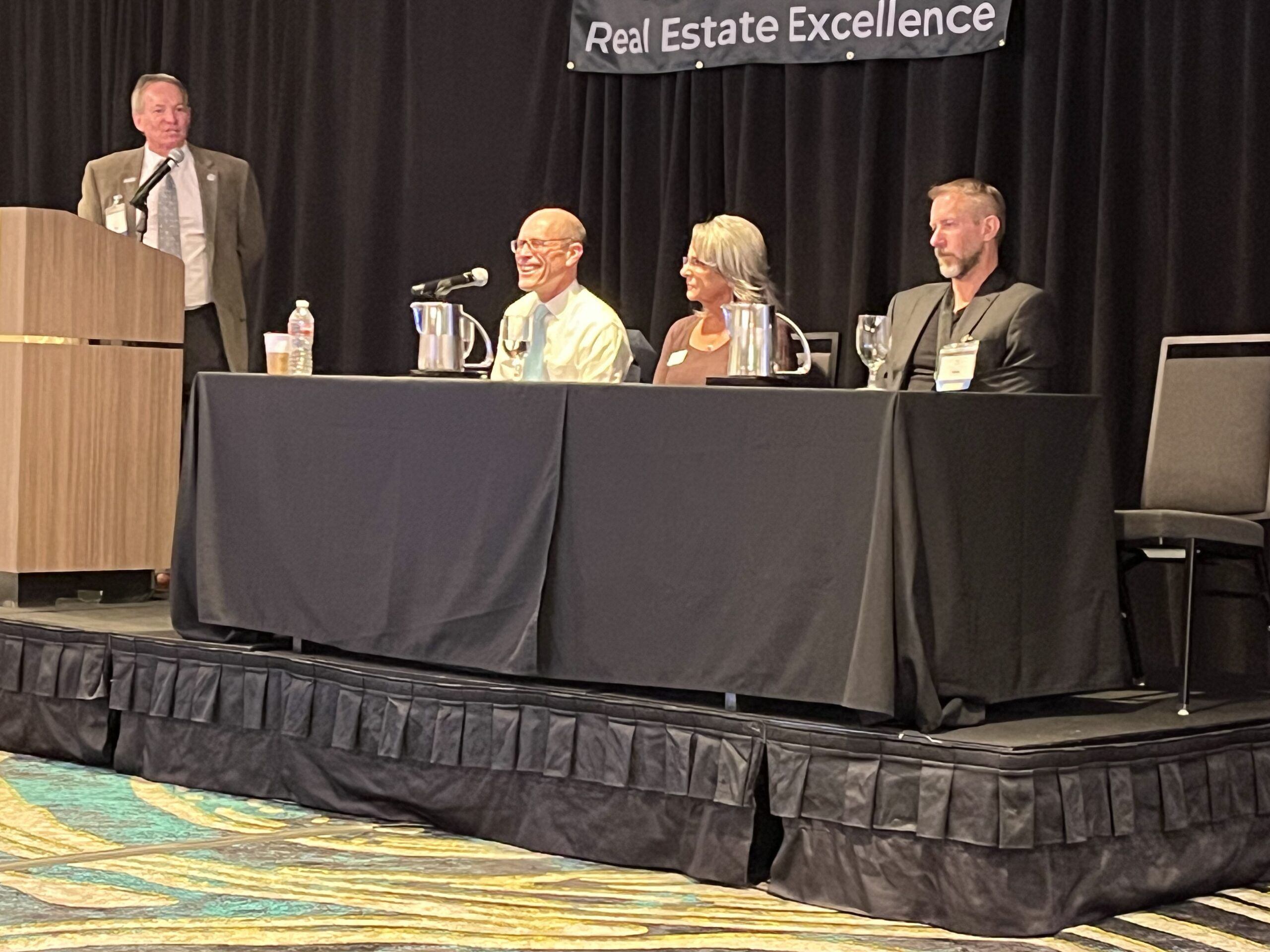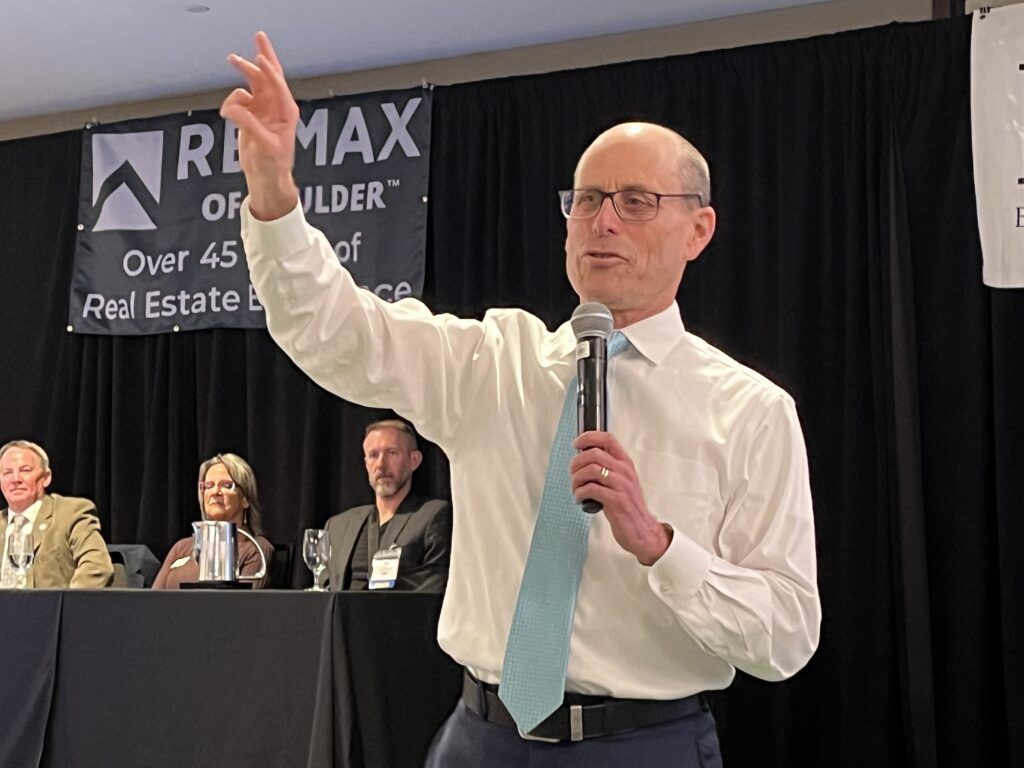Real estate agents will continue to receive pay for their work, despite lawsuit

BOULDER — Have no fear, Realtors, you’ll continue to receive compensation for your work, real estate experts told attendees at BizWest’s annual Boulder Valley Real Estate Conference on Thursday.
Commissions were the topic of one of the sessions at the summit, which was held at the Embassy Suites Hotel in Boulder. The session grew out of a developing news story about home buyers in the Midwest who sued — and won — a case against their real estate agents and the National Association of Realtors over how commissions are determined.
In the past few days, the jury in the case determined that NAR and real estate brokers with Home Services of America and Keller Williams were guilty of colluding to inflate real estate commissions. They assessed a judgment of $1.78 billion against those entities. Earlier, Re/Max and Anywhere Realty agreed to a $139 million settlement in the case.
SPONSORED CONTENT
Select your Republic Services residential cart now!
In preparation for Republic Services becoming the primary provider of residential recycling, yard trimmings, and trash, residents should now select the best cart size and service schedule for their household needs.
The lawsuit involved how broker fees are assessed, specifically the share of the sales commission that is paid to the buyer’s real estate agent. NAR’s Clear Cooperation Rule requires that the seller of property include a fee to the buyer’s agent — usually a share of the overall real estate commission. The buyer’s agent fee is visible to the buyer’s agent but might not be visible to the buyer of the property.
The lawsuit alleged that the fees artificially drive up home prices as agents for buyers direct buyers to properties that offer compensation. The lawsuit also alleged that sellers were not aware that they could negotiate the commission that they ultimately pay.
The concept of real estate commissions has long been a topic of discussion among Realtors and their customers. Duane Duggan, an agent with Re/Max of Boulder, who moderated a panel discussion on the topic, said he was taught early in his career that the commission was a transaction fee. “The transaction pays the fee, not the buyer or the seller,” he said.
Still, the topic of fees or commissions requires real estate professionals to clearly disclose what is charged and who is paying what. Colorado’s real estate contracts, designed by the Department of Regulatory Agencies, includes the language that helps agents do that. Realtors were advised to make sure that their customers understand the language.
Jon Goodman, an attorney with Frascona, Joiner, Goodman & Greenstein PC, said the slow moving lawsuit that was just determined was “kind of like astronomers noticing meteors coming into the solar system and trying to determine when and if they’d hit the Earth.”
Now, Realtors want to know how the judgment is going to affect them — one Realtor in the audience asked about an appointment he had scheduled for Friday and how he should approach it.
“The judgment is only about 60% of the story in this one case. We’re awaiting the court to issue injunctive relief, or ‘practice order changes,’” he said. “What are the changes going to be — well, look at the settlement agreements that Re/Max and Anywhere entered into. The practice order changes won’t be any less than what those two firms already agreed to,” Goodman said.
“Those settlement agreements require more transparency between brokers and their clients.
Franchisors cannot require franchisees to be Realtors or require their agents to be Realtors,” he said.

Re/Max of Boulder has already told its agents that they don’t need the official Realtor designation in order to be real estate agents. Nor do they need to be members of the NAR or the local real estate associations. Re/Max and others do support the ethical guidelines that NAR and local associations require of their members.
Goodman said that real estate agents can still encourage their customers to pay co-op fees — the share of the commission that goes to the buyer’s agent — and he outlined the argument that they can use with customers.
He said it is in the best interests of the seller to keep the pool of potential buyers as large as possible. If buyers are required to pay a share of the sales commission, then the offer for the property is likely to be smaller than would otherwise be the case, he said.
Or, Goodman said, if the buyer stretches to buy a property above what can otherwise be afforded, “they only have so much cash, so they have to borrow more, which may increase the interest rate on the loan and increase the mortgage insurance premium,” he said. “As a seller, you don’t want to reduce the pool of potential buyers” by driving up the buyer cost.
“You want to be focused on your net. If you pay the other side’s broker, you’re likely to gross more and it will net out the same. So why artificially reduce the pool of buyers,” he asked.
Amy Aschenbrenner, vice president of government affairs at BoLo Realtors, the Boulder/Longmont Realtor association, said the most recently determined lawsuit over commissions is just the start. She said five additional lawsuits have now been filed “and they’re not going to stop there,” she said. “It will change the fabric of the real estate industry as we know it today.”
She said the solution is “have that conversation” with the customer and, “in the commercial real estate world, to have that conversation with tenants, too,” she said.
It needs to be made clear that commissions can be negotiated, and in the process, Realtors can “show your value to your clients.”
Jay Kalinski, owner of Re/Max of Boulder and Re/Max Elevate, predicted that the industry will see fewer Realtors and fewer licensed agents, because being a licensed Realtor is not required in the industry in order to sell properties.
“I think some great things will come out of these lawsuits. I don’t think there is price fixing. I do think there will be more transparency. A lot of the time, clients are just confused. They don’t do this (sell or buy properties) all the time and improving how we communicate will be key,” Kalinski said. “Those of us who are professional and can articulate our value will do really well.”


